




Vijay Kumar
I was diagnosed as having spine tuberculosis. Despite on treatment my back pain persisted and I was unable to walk.
Treatments
Head Injury
Head injury", is a broad term that describes a variety of injuries and damages to the scalp, skull, brain and underlying tissue and blood vessels in the head.
What are the common causes?
In India, head injury occurs most commonly after motor vehicle accidents, falls from height or at work, acts of violence, sports and recreational injuries.
Concussion – when there is loss of consciousness.
What are the signs & symptoms?
Varying degrees of symptoms including temporary or permanent loss of consciousness, nausea, vomiting, headache, giddiness, and loss of memory may appear associated with the severity of the head injury. The signs and symptoms of a head injury may occur immediately or develop slowly over several hours to days.
Even if no serious injury is found, careful watching with a responsible adult either at home or hospital must occur in the first 24-48 hours after the injury.
For the 1st 24 hour after a head injury, the person SHOULD NOT:
- Be left alone
- Drive a vehicle or operate machinery
- Take alcohol or any medications that can cause drowsiness
Call for help or go to the emergency department if:
- Any symptoms is getting worse e.g. sleepiness, headache, vomiting, dizziness
- Changes in behaviour e.g. irritability, confusion
- Weakness or numbness in the arms or legs
- Trouble walking or talking
- Fits or seizures
Investigations
CT scan of the brain may be ordered if the doctor thinks that there is risks of acute bleeding that can cause life-threatening problem.
What is the treatment?
Treatment is individualised, depending on the degree and extent of injuries. It ranges from observation for signs of worsening such as drowsiness, increasing headache or giddiness (minor head injury) to removal of the blood clot in the brain to relieve the pressure in the brain (cause by the blood clot) or insertion of a brain pressure monitor (severe head injury).
Treatments for most minor head injuries include symptom relief and adequate rest.
What is the outcomes ?
This depends in the type, location and degrees of injury. People with a minor head injury may have concussion syndromes such as slight headache, giddiness, easily tired, decreased concentration etc that may persist for a while, but most recover with no permanent problems. After a severe head injury, one-third make good recovery, one-third is left with varying degrees of disability, and the rest do not survive.
Also consult your doctor – if you have running nose after head injury. It can be brain fluid.
TRAUMATIC BRAIN AND SKULL INJURY REQUIRING SURGERY.
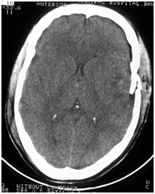
Depressed skull fractures.

Air in the skull
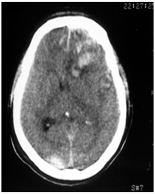
Brain contusion
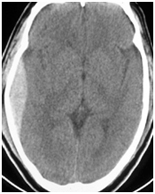
Extradural hematoma
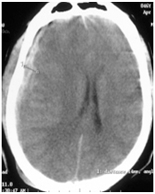
Subdural hematoma
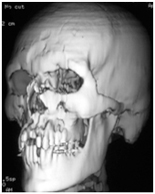
Lefort fracture with CSF leak




